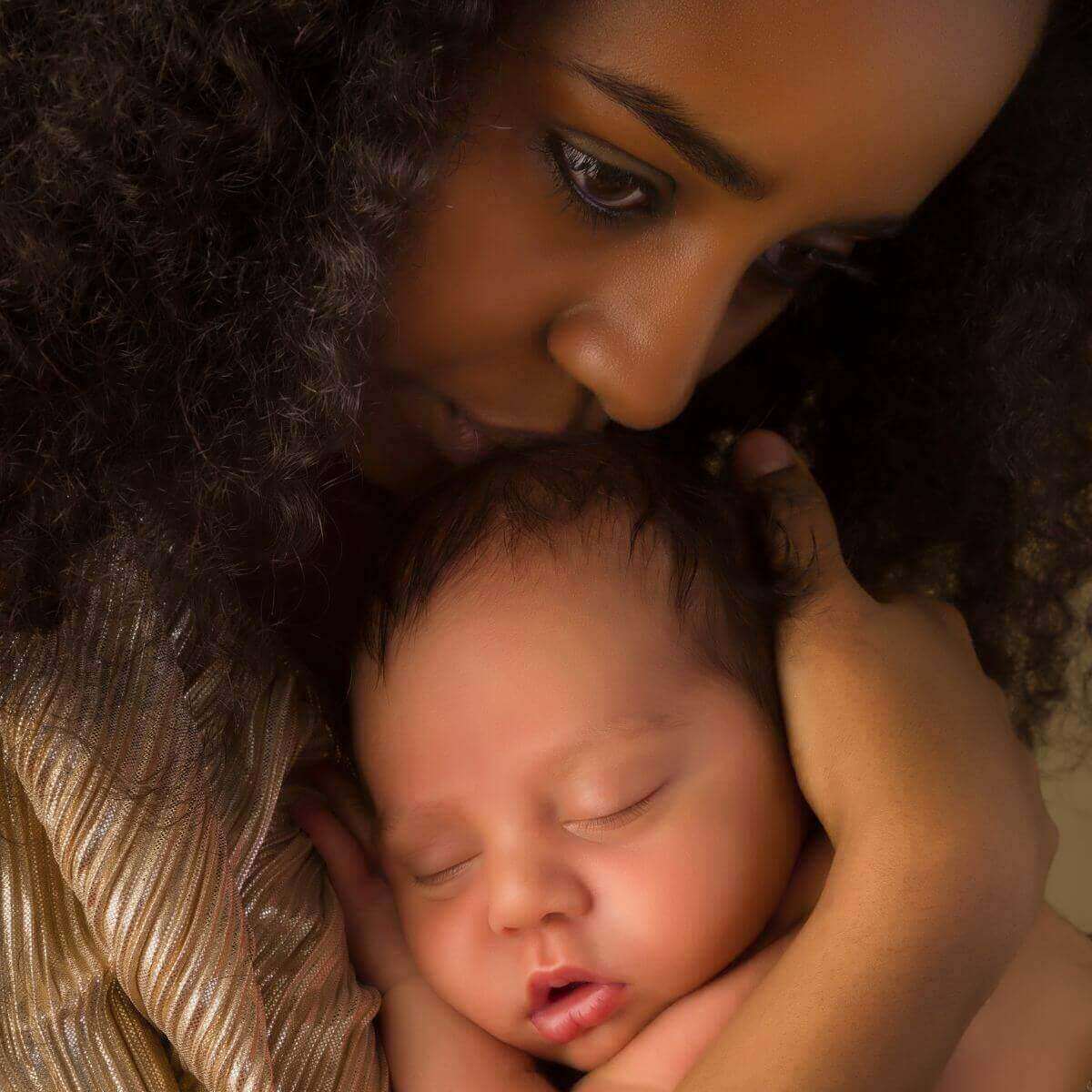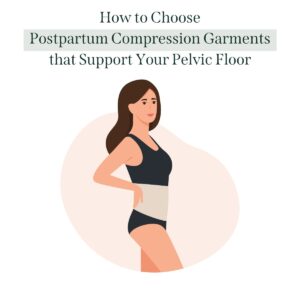Picture this: you’re holding your new baby in the first couple of days after birth, and tears begin to fall. You have no idea why this is happening because nothing is technically wrong.
While it would be easy to brush them off as “happy tears” that you just don’t quite understand, this isn’t always true.
Moments of despondence after birth are common and can sometimes lead you to the question, “What are the baby blues?”
First, let’s talk about how most media depicts the postpartum period. Fairy tales and movies would have us believe that giving birth to a new baby is a MASSIVELY magical moment filled with nothing but love, joy, and excitement.
The baby is placed on your chest, and WHAM!, you love it and everything around you is amazing.
But while those emotions ARE often part of the process, it’s not unusual to have other, less magical feelings.
Sadness, fear, restlessness, anxiety–each of these “negative” emotions is entirely possible during the early days of motherhood. And not only are they possible, they probably will rear their heads.
“Baby blues” is an umbrella term that describes these challenging moments and feelings many of us struggle with during our first days postpartum. The problem is, we’re not always educated to realize they’re a “thing.”
We also might not have essential information to differentiate between typical baby blues and something more severe, like postpartum depression and postpartum anxiety, or even postpartum psychosis.
You’re not alone if you’re questioning whether your post-childbirth feelings are normal.
Please read on to learn more about why we might experience the baby blues, how to alleviate them, and, most importantly, when to seek outside help from your doctor.

This site contains affiliate links, meaning that we earn a small commission for purchases made through our site. We only recommend products we personally use, love, or have thoroughly vetted.
- What Are Baby Blues and What Causes Them?
- What Causes the Baby Blues?
- How Common Are the Blues After Childbirth?
- Baby Blues vs. Postpartum Depression, Postpartum Psychosis, and Postpartum Anxiety: Are Your Feelings a Warning Sign?
- What Should You Do if You Think You’re Suffering from PPD PPA Or PPP?
- Tips for Dealing with the Baby Blues After Delivery
- Postpartum Emotions After Childbirth Are Normal!
- What Are the Baby Blues: FAQ
What Are Baby Blues and What Causes Them?
I remember a day after our eldest was born when I suddenly felt weepy. Not an “I love you so much and can’t believe I’m a mom” sensation, but a “what the hell did I do?” kind of feeling.
However, my mild feelings of sadness quickly transformed into anxiety when I began to question what was wrong with me.
I felt selfish.
I felt ungrateful.
I felt like a bad mom.
Here I had this gorgeous girl that we’d fought so hard to bring into the world, and I was feeling sad about my current state. The moment didn’t last long or reoccur, which meant that, for me, this was the baby blues.
The American Pregnancy Association defines baby blues as the “least severe form of postpartum depression” and suggests that they only last about 14 days after delivery.
It turns out that mood changes like these are not uncommon after childbirth–most doctors refer to them as the “baby blues.” This shift in our mental state usually starts around 4-5 days after delivery, though it can begin earlier.
Symptoms of The Baby Blues
Symptoms of baby blues include, but are not limited to:
- Restlessness
- Anxiety
- Impatience
- Irritability
- Fatigue
- Insomnia
- Sadness
- Mood swings
- Lack of concentration
These symptoms typically last a few minutes or a few hours per day for about 14 days, so if you feel like your symptoms are sticking around longer than a few hours a day and for longer than two weeks after delivery, please talk to your doctor!
What Causes the Baby Blues?
So, what causes this post-birth experience? Why do our emotions take such wild turns during the early days of parenthood?
While the exact reason we deal with the baby blues is unknown, healthcare professionals believe certain factors play a significant role, including hormonal shifts, sleep deprivation, and disruptions to routines.
1. Hormones After Childbirth
Throughout pregnancy, our estrogen and progesterone levels rise. After we deliver, new mothers experience a natural decrease in these hormone levels that can lead to mood swings.
Some of us will also have a dip in the hormones produced by our thyroids. This contributes to fatigue and possible depression.
2. Sleep Deprivation
When you’re waking up multiple times a night, struggling to get to sleep in the first place, and getting out of bed earlier than you might be used to, it’s no wonder so many of us end up sleep deprived as we settle into our new role as parents!
More than just leaving us tired throughout the day, sleep deprivation can negatively impact our emotional state, especially if we’re already suffering from baby blues.
3. Change to Routines
We, humans, are creatures of habit. Throw a baby into the mix, and you can throw your regular schedule and procedures out the window! While a few disturbances to our day-to-day routines might not seem like a huge ordeal, they can be.
An article from Northwestern Medicine asserts that routines are our usual method of stress management. Without them, our stress and anxiety levels may rise, negatively impacting our mental health.
Note: It’s crucial to recognize that if you’re dealing with factors like the ones listed above, there’s no guarantee you’ll end up with the baby blues. These are simply common reasons that your postpartum emotions might not be stellar.
How Common Are the Blues After Childbirth?
So, we’ve answered the question, “What are baby blues?” and you might be wondering how common they are. Research shows approximately 70 – 80% of us will experience some level of “new mom feels.”
Can My Partner Get the Postpartum Blues?
Absolutely! While your partner might not go through the physical childbirth process, their life is going through the same transition as yours. Up to 10% of our partners might experience general sadness or depression symptoms after our babies are born.
It’s important to have open conversations about mental health with your partner after the birth of your child. There is no shame in either one of you getting outside support when you feel low or overwhelmed!
Baby Blues vs. Postpartum Depression, Postpartum Psychosis, and Postpartum Anxiety: Are Your Feelings a Warning Sign?
While getting the baby blues after delivery is normal, it’s essential to also understand the symptoms of postpartum depression and other postpartum disorders that might require immediate medical attention.
Some people might describe the baby blues as feeling a little “down,” but the signs of postpartum depression and psychosis are more significant and concerning.
If you’re wondering if your symptoms require further treatment, please take a look at the information below.
1. Symptoms of Postpartum Depression (PPD)
Studies show that 10 – 20% of new mamas will struggle with postpartum depression. This condition is a more intense version of the baby blues that usually lasts longer than a couple of weeks, often up to a year after birth or more.
Some indicators you might have PPD include:
- Feelings of worthlessness or hopelessness
- Increased anxiety or excessive worrying
- Lack of energy
- Changes in appetite
- Suicidal thoughts or thoughts of harming your baby
- Sleep troubles (either insomnia or wanting to sleep all the time)
- Feelings of mom guilt
- Little interest in interacting with your baby
- Poor concentration on activities, i.e., your job, housework, or hobbies
2. Symptoms of Postpartum Psychosis
Postpartum psychosis is a rare disorder that only affects 0.089 to 2.6 people per 1000 births. Despite its rarity, it’s a severe condition that should be treated as a medical emergency, as 4 to 5% of cases can result in suicide or infanticide.
Along with many of the same side effects as PPD, the two primary symptoms of this disorder are hallucinations and delusions. Postpartum psychosis has a way of changing the way patients view, understand, and experience their lives and the world around them.
Other symptoms include:
- Manic episodes
- Depression
- Depersonalization
- Aggression
If you’re concerned that you or someone you love is experiencing postpartum psychosis, PLEASE don’t wait to seek help. Often, this condition requires intervention and psychotherapy as a part of the treatment process.
3. Symptoms of Postpartum Anxiety
As someone who struggles with anxiety, I’ve noticed that some people tend to lump this disorder in with depression. In reality, though, it comes with its own set of symptoms.
After you have a baby, you might notice side effects from postpartum anxiety, such as:
- Repeatedly Checking on Things
- Trouble Sitting Still
- Nausea and/or Vomiting
- Becoming Overly Cautious or Worried About Normal Situations
- Difficulties Calming Down
- Obsessive Thoughts or Irrational Fears
- Feeling Shortness of Breath
- Irritability
These symptoms can be managed by working with a therapist or psychiatrist. There is no shame in getting help for the extra anxiety you feel after having a baby (or the anxiety you normally feel, for that matter!).
What Should You Do if You Think You’re Suffering from PPD PPA Or PPP?
Do you suspect you could have postpartum depression, anxiety, or psychosis? The best thing to do is make an appointment with your doctor. They can advise you on the next best steps for treatment.
Never feel ashamed or scared to seek help and receive the mental health care you deserve. If you’re not sure who to contact to get the help you need, consider one of the following resources:
- Substances Abuse and Mental Health Services Administration (SAMHSA) National Helpline: 1-800-662-HELP (4357)
- Postpartum Support International (PSI) Help Line: 1-800-944-4773
- Postpartum Progress (This website provides links to organizations and resources throughout all 50 states.)
- 988 Suicide and Crisis Lifeline
Tips for Dealing with the Baby Blues After Delivery
Even if you don’t develop one of the more significant mood disorders above, the baby blues can be an incredibly frustrating thing to deal with.
If you’re looking for ways to reduce your symptoms, please try the following suggestions.
- Get as Much Sleep As Possible: We know your baby will probably wake you up at night, but it’s important to practice healthy sleep habits as much as possible after childbirth. And don’t be afraid to put off housework and take a nap while they do during the day.
- Ask for Help: Having a baby is a lot of work–don’t try to do it alone! From baby care to household chores, let your partner, friends, or family know if you need a hand.
- Find Things to Do: Try not to get “stuck” sitting around the house all day. Take your little one out and about. This will help keep you busy and improve your mental well-being.
- Talk to Other Moms: Given how common the baby blues are, there’s a good chance someone you know has dealt with them. Ask your fellow mom friends for advice.
- Stress Management and Self-Care: It’s hard to find time for YOU after having a baby. To benefit your mental health, though, it’s imperative you do. Finding ways to manage your stress and practicing self-care is integral to emotional and mental health. From starting a hobby to taking a bubble bath, find something that makes you feel good and helps you relax.
- Get Some Exercise: Stepping back into a full-fledged workout routine during the first 6 weeks after delivery isn’t suggested by doctors. That doesn’t mean that you can’t get your body moving a little bit. Low-key walks or gentle pelvic floor exercises won’t just make you feel good physically, but they can help with your mental state, too.
- Counseling Services: Speaking to a therapist is one of the best choices you can make if you’re dealing with some type of postpartum mood disorder. Ask your doctor or loved ones for trustworthy recommendations if you don’t already have a counselor you feel comfortable with.
Postpartum Emotions After Childbirth Are Normal!
As someone who regularly struggles with anxiety, I understand how frustrating it is to hear someone tell you to “just calm down” when feeling overwhelmed and emotional.
So I’m not going to do that.
I would like to gently remind you, however, that stressing out about how you’re feeling often makes the experience even worse (as I said, I speak from experience!).
Whether you’re struggling with typical baby blues or postpartum depression or anxiety, there are proactive steps you can take to manage the problem. Rather than letting your negative feelings after baby take control of you, see if you can focus on smaller steps to help you feel more in control.
Practice stress management.
Make an appointment with your doctor.
Have a conversation with your partner or another supportive person in your life. Other mamas who have been through this are especially helpful!
Don’t be afraid to ask for help. Getting assistance with your mental health isn’t always easy, but it is the brave thing to do!
And remember, mama, this is a single chapter in your parenting book. Getting the help you need and deserve IS good parenting.
What else do you need to know about the baby blues? Will these tips help you during your postpartum period?
What Are the Baby Blues: FAQ
A mild postpartum mood disorder that affects a large number of new moms. Common symptoms of baby blues include weepiness, mood swings, and fatigue. Baby blues typically last for 14 days after delivery.
Many new moms start experiencing symptoms of postpartum blues during the first couple of days after childbirth. Thankfully, they usually only last a couple of weeks.
The short answer is no. Postpartum depression and psychosis are mental health disorders that require professional treatment.
Time is the best treatment for the baby blues, but you can also improve your sleep habits, practice stress management, and communicate with your partner when you need help.










